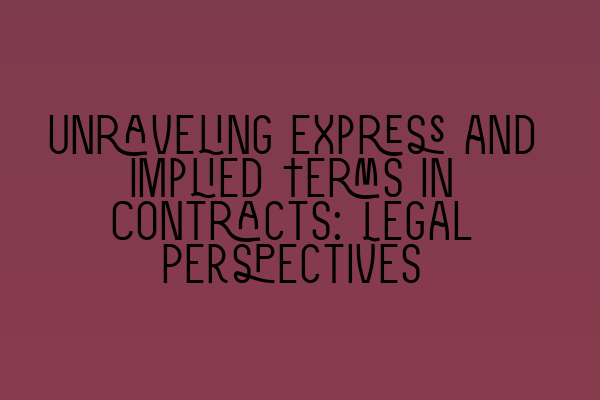Unraveling Express and Implied Terms in Contracts: Legal Perspectives
When entering into a contract, it’s essential to understand the various terms that govern the agreement. The terms of a contract can be classified into two main categories: express and implied terms. In this article, we will explore the differences between these two types of terms and their legal implications.
Express Terms
Express terms are the explicit provisions that the parties to a contract agree upon and include in the written or oral agreement. These terms are expressly stated and leave no room for interpretation. They are usually documented in writing and signed by the parties involved. Express terms can include clauses related to payment, delivery, duration, and any other specific conditions that the parties wish to include in the contract.
For example, in a construction contract, the express terms may include the completion date, the payment schedule, and the scope of the work to be performed. These terms are crucial as they provide clarity and certainty to the contracting parties, helping them understand their respective obligations and rights.
It’s important to note that in some cases, express terms can also be incorporated into a contract by reference. This means that instead of explicitly stating the terms in the contract, the parties may refer to another document, such as terms and conditions or a separate agreement, which contains the express terms. In such cases, it is essential to ensure that the referred document is readily available and accessible to all parties involved in the contract.
Implied Terms
Unlike express terms, implied terms are not explicitly stated in the contract but are nonetheless considered a part of the agreement. These terms are not written or discussed by the parties but are imposed by law or custom. Implied terms are based on legal principles that aim to protect the reasonable expectations and rights of the parties involved.
There are two main types of implied terms: terms implied by statute and terms implied by common law.
Terms Implied by Statute
Terms implied by statute are those that are automatically included in contracts of certain types or in specific situations, as mandated by relevant legislation. These terms aim to protect the weaker party in the contract or safeguard public interest. For example, consumer contracts often have implied terms that protect consumers’ rights regarding the quality, fitness for purpose, and safety of the products or services they purchase.
Statutory implied terms can also be influenced by industry-specific regulations. For instance, construction contracts may have implied terms related to health and safety, or employment contracts may include implied terms regarding minimum wage and working hours.
Terms Implied by Common Law
Terms implied by common law are those that are inferred by courts based on established legal precedents and customary practices. These terms are not explicitly mentioned by the parties, but courts consider them necessary to give effect to the intention of the parties or to ensure fairness and equity in the contractual relationship.
For example, the courts have implied terms of good faith and fair dealing in contracts, meaning that the parties are expected to act honestly and in good faith when performing their contractual obligations. Similarly, a landlord-tenant contract may be subject to an implied term that the property will be fit for habitation.
Legal Considerations and Disputes
Understanding the difference between express and implied terms is crucial, as it can greatly impact the interpretation and enforcement of a contract. When a dispute arises regarding the terms of a contract, it is essential to determine whether the term in question is express or implied, as the legal remedies and obligations can vary.
It’s worth noting that the courts tend to prioritize express terms over implied terms. This means that if there is an express term that addresses the issue at hand, it will usually take precedence over any implied term that may conflict with it. However, there may be instances where a court deems an implied term to be necessary, despite an express term on the same issue.
When drafting a contract, it is advisable to clearly specify the express terms to avoid any ambiguity. However, it’s also important to be mindful of any implied terms that may be applicable. A well-drafted contract should address both express and relevant implied terms to ensure fairness, clarity, and legal compliance.
In conclusion, express and implied terms play a crucial role in contract law. Express terms provide certainty and clarity, while implied terms ensure fairness and protect the rights of the parties. Understanding the distinction between these two categories of terms is essential for effective contract formation, interpretation, and enforcement. Lawyers and solicitors should always carefully analyze the terms of a contract to protect their clients’ interests and ensure legal compliance.
Related Articles
For further preparation in contract law, you may find the following articles helpful:
